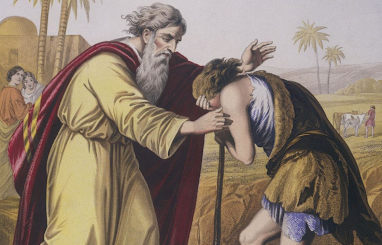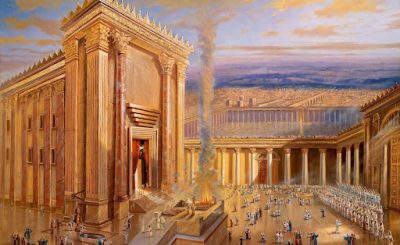Обещание на Йом Киппур: всегда подвергать сомнению установившиеся нормы: эта то обещание, которое – по мнению ортодоксального раввина Сакса — каждый еврей должен дать на Йом Киппур. И Раввин Сакс обосновывает это в нижеприведенной статье на английском языке, обосновывая это ссылками на авторитеты Торы. Поскольку это то, что я постоянно делаю в моих статьях, я решил привести эту статью в оригинале; самое существенное в оригинале я выделил курсивом.
—————————————————————————
To be a Jew is to swim against the current
The Chief Rabbi Sacks explores the spiritual challenges of Yom Kippur
By Lord Sacks, September 20, 2012
To those who fully open themselves to it, Yom Kippur is a life-transforming experience. It tells us that God, who created the universe in love and forgiveness, reaches out to us in love and forgiveness, asking us to love and forgive others.
God never asked us not to make mistakes. All He asks is that we acknowledge our mistakes, learn from them, grow through them, and make amends where we can.
No religion has held such a high view of human possibility. The God who created us in His image, gave us freedom. We are not tainted by original sin, destined to fail, caught in the grip of an evil only divine grace can defeat. To the contrary we have within us the power to choose life. Together we have the power to change the world.
Nor are we, as some scientific materialists claim, mere concatenations of chemicals, a bundle of selfish genes blindly replicating themselves into the future. Our souls are more than our minds, our minds are more than our brains, and our brains are more than mere chemical impulses responding to stimuli. Human freedom — the freedom to choose to be better than we were — remains a mystery but it is not a mere given. Freedom is like a muscle and the more we exercise it, the stronger and healthier it becomes.
Judaism constantly asks us to exercise our freedom. To be a Jew is not to go with the flow, to be like everyone else, to follow the path of least resistance, to worship the conventional wisdom of the age. To the contrary, to be a Jew is to have the courage to live in a way that is not the way of everyone. Each time we eat, drink, pray or go to work, we are conscious of the demands our faith makes on us, to live God’s will and be one of His ambassadors to the world. Judaism always has been, perhaps always will be, countercultural.
In ages of collectivism, Jews emphasized the value of the individual. In ages of individualism, Jews built strong communities. When most of humanity was consigned to ignorance, Jews were highly literate. When others were building monuments and amphitheaters, Jews were building schools. In materialistic times they kept faith with the spiritual. In ages of poverty they practiced tzedakah so that none would lack the essentials of a dignified life.
The sages said that Abraham was called Ha’ivri, “the Hebrew,” because all the world was on one side (ever echad) and Abraham on the other (Bereshit Rabbah 42:8). To be a Jew is to swim against the current, challenging the idols of the age whatever the idol, whatever the age.
So, as our ancestors used to say, “S’iz schver tzu zein a Yid,” “It is not easy to be a Jew”. But if Jews have contributed to the human heritage out of all proportion to our numbers, the explanation lies here. Those of whom great things are asked, become great — not because they are inherently better or more gifted than others but because they feel themselves challenged, summoned, to greatness.
Few religions have asked more of their followers. There are 613 commandments in the Torah. Jewish law applies to every aspect of our being, from the highest aspirations to the most prosaic details of quotidian life.
Our library of sacred texts — Tanach, Mishnah, Gemara, Midrash, codes and commentaries — is so vast that no lifetime is long enough to master it. Theophrastus, a pupil of Aristotle, sought for a description that would explain to his fellow Greeks what Jews are. The answer he came up with was, “a nation of philosophers”.
So high does Judaism set the bar that it is inevitable that we should fall short time and again. This means that forgiveness was written into the script from the beginning. God, said the sages, sought to create the world under the attribute of strict justice but He saw that it could not stand.
What did He do? He added mercy to justice, compassion to retribution, forbearance to the strict rule of law. God forgives. Judaism is a religion, the world’s first, of forgiveness.
Not every civilization is as forgiving as Judaism. There were religions that never forgave Jews for refusing to convert. Many of the greatest European intellectuals — among them Voltaire, Fichte, Kant, Hegel, Schopenhauer, Nietzsche, Frege and Heidegger — never quite forgave Jews for staying Jews, different, angular, countercultural, iconoclastic. Yet despite the tragedies of more than twenty centuries, Jews and Judaism still flourish, refusing to grant victory to cultures of contempt or the angel of death.
The majesty and mystery of Judaism is that though at best Jews were a small people in a small land, no match for the circumambient empires that periodically assaulted them, Jews did not give way to self-hate, self-disesteem or despair.
Beneath the awe and solemnity of Yom Kippur one fact shines radiant throughout: that God loves us more than we love ourselves. He believes in us more than we believe in ourselves. He never gives up on us, however many times we slip and fall. The story of Judaism from beginning to end is the tale of a love of God for a people who rarely fully reciprocated that love, yet never altogether failed to be moved by it.
Rabbi Akiva put it best in a mere two words: Avinu Malkenu (Talmud, Ta’anit 25b). Yes, You are our Sovereign, God Almighty, Maker of the cosmos, King of kings. But You are also our Father. You told Moses to say to Pharaoh in Your name: “My child, My firstborn, Israel” (Exodus 4:22). That love continues to make Jews a symbol of hope to humanity, testifying that a nation does not need to be large to be great, nor powerful to have influence.
Each of us can, by a single act of kindness or generosity of spirit, cause a ray of the divine light to shine in the human darkness, allowing the Shechinah, at least for a moment, to be at home in our world.
More than Yom Kippur expresses our faith in God, it is the expression of God’s faith in us.
***
In 1888, Alfred Nobel, the man who invented dynamite, was reading his morning papers when, with a shock, he found himself reading his own obituary. It turned out that a journalist had made a simple mistake. It was Nobel’s brother who had died.
What horrified Nobel was what he read. It spoke about “the dynamite king” who had made a fortune from explosives. Nobel suddenly realized that if he did not change his life, that was all he would be remembered for. At that moment he decided to dedicate his fortune to creating five annual prizes for those who’d made outstanding contributions in physics, chemistry, medicine, literature and peace.
Nobel chose to be remembered not for selling weapons of destruction but for honoring contributions to human knowledge. The question Yom Kippur forces on us is not so much “Will we live?” but “How will we live?” For what would we wish to be remembered? On this day of days we are brutally candid: “Before I was formed I was unworthy, and now that I have been formed it is as if I had not been formed. I am dust while alive, how much more so when I am dead” (the Yom Kippur Machzor). Yet the same faith that inspired those words also declared that we should see ourselves and the world as if equally poised between merit and guilt, and that our next act could tilt the balance, for my life and for the world (Maimonides, Laws of Repentance 3:4).
Judaism lives in this dialect between our smallness and our potential greatness. We may be dust, but within us are immortal longings. Yom Kippur invites us to become better than we were in the knowledge that we can be better than we are. That knowledge comes from God.
I remember as a student hearing a witty put-down of a brash business tycoon: “He is a self-made man, thereby relieving God of a great responsibility.” If we are only self-made, we live within the prison of our own limitations. The truly great human beings are those who have opened themselves to the inspiration of something greater than themselves. “Wherever you find the greatness of God,” said Rabbi Yohanan, “there you find His humility” (Talmud, Megillah 31a).
Yom Kippur is about the humility that leads to greatness: our ability to say, over and over again, “We have sinned,” and yet know that this is not a maudlin self-abasement, but rather, the prelude to greater achievement in the future, the way a champion in any sport, a maestro in any field, reviews his or her past mistakes as part of their preparation for the next challenge, the next rung to climb.
Jews had a genius for spiritual greatness. Even Sigmund Freud, hostile as he was to religion in general, could not but express admiration in the last book he wrote, Moses and Monotheism, for the way Judaism produced not one charismatic figure but generation after generation of them.
The philosopher Ludwig Wittgenstein, even more ambivalent about his Jewish ancestry, wrote in his notebook in 1931, “Amongst Jews ‘genius’ is found only in the holy man.” Jews had this genius not because they are better than others — often, reading the prophets, you get the impression that the opposite was sometimes true – but because they worked harder at it. The Hebrew word for serving God, avodah, also means “hard work.”
Judaism takes the simple things of life and makes them holy. Kashrut makes eating holy. Kiddush makes drinking holy. The laws of family purity make the physical relationship between husband and wife holy. Study sanctifies the intellect. Prayer reconfigures the mind. Constant acts of generosity and care sharpen our emotional intelligence, honing our skills of empathy.
Judaism, as Rabbi Joseph Soloveitchik put it, sees creativity as the essence of humanity, and our greatest creation is our self. We forge our life in the fire of love: love of God, the neighbor and the stranger. And by sanctifying family and community, Judaism sacralizes the bonds of belonging that make us who we are.
The power of Yom Kippur is that it brings us face to face with these truths. Through its words, music and devotions, through the way it focuses energies by depriving us of all the physical pleasures we normally associate with a Jewish festival, through the sheer driving passion of the liturgy with its hundred ways of saying sorry, it confronts us with the ultimate question: How will we live?
Will we live a life that explores to the full the capacity of the human mind to reach out to that which lies beyond it? Will we grow emotionally? Will we learn the arts of loyalty and love? Will we train our inner ear to hear the cry of the lonely and the poor? Will we live a life that makes a difference, bringing the world-that-is a little closer to being the world-that-ought-to-be? Will we open our hearts and minds to God?
It is possible to live a lifetime without asking any of these questions.
It is the genius of Judaism that it makes us do so once a year, when God is close to us because we are close to Him. Yom Kippur retains the traces of those two great figures, Moses the prophet and Aaron the priest, who between them created a tension between spontaneity and structure, passion and order, which continues to vitalize the Jewish spirit, giving it the blessings of both restlessness and rest.
Alone with God, together with our people, singing the songs and praying the prayers they said in every age under the most diverse circumstances, we find ourselves questioned, challenged, summoned, inspired.
Like Moses on the mountain, like Aaron in the Holy of Holies, we come as near as we can to being face-to-face with God, and after it we are not the same as we were before. That personal transformation, the ability to make our tomorrow greater than our yesterday, is the essence of teshuvah and of Yom Kippur.
The most demanding day of the Jewish year, a day without food and drink, a day of prayer and penitence, confession and pleading, in which we accuse ourselves of every conceivable sin, still calls to Jews, touching the open arms of God, weeping because we may have disappointed Him, or because sometimes we feel He has disappointed us, yet knowing that we need one another, for though God can create universes, He cannot live within the human heart unless we let Him in.
It is a day not just of confession and forgiveness but of a profound liberation. Atonement means that we can begin again. We are not held captive by the past, by our failures. The book is open and God invites us — His hand guiding us the way a scribe guides the hand of those who write a letter in a Torah scroll — to write a new chapter in the story of our people, a chapter uniquely our own yet one that we cannot write on our own without being open to something vaster than we will ever fully understand. It is a day on which God invites us to greatness.
May He forgive us. May we, lifted by His love, rise to meet His call.





